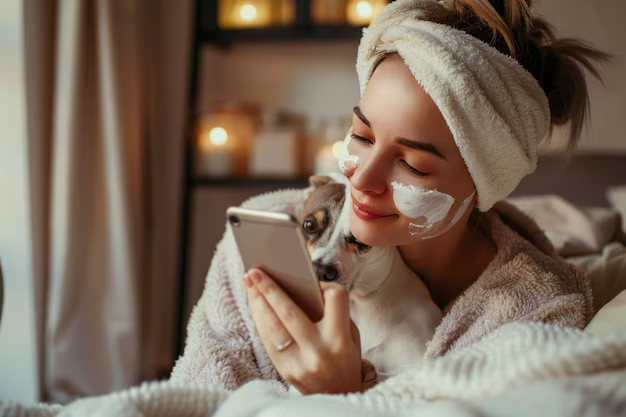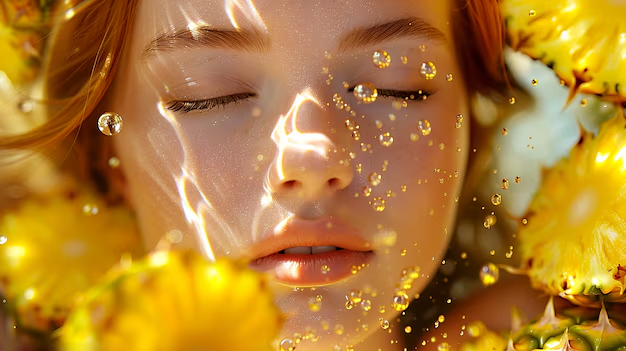What Is The Best Skincare Routine For Oily Skin?
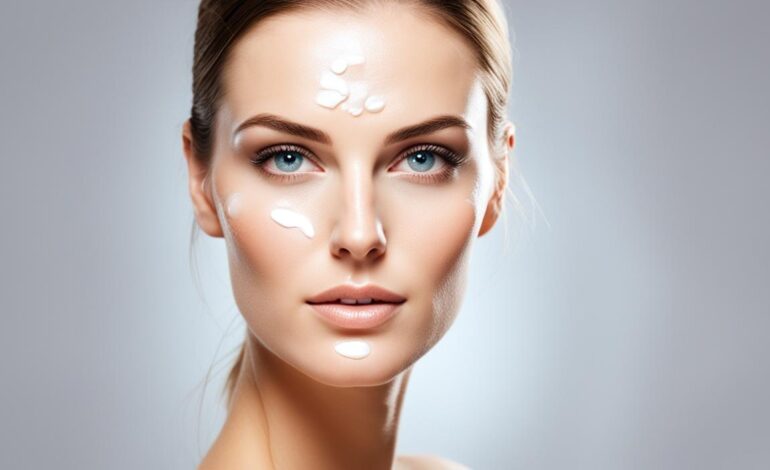
Do you battle oily skin? The right skincare routine is key to a balanced, shine-free look. This guide will explore what you need to cleanse, tone, exfoliate, and fight blemishes. We aim to keep your skin radiant and healthy with minimal oil.
Managing oily skin involves special care. The right skincare can tame oil production, lessen visible enlarged pores, and stop acne breakouts. Learn how to tailor your routine to achieve a smooth, matte finish, reducing shine, clogged pores, and blemishes.
This piece will outline the daily steps for oily skin, recommend top ingredients, and share expert techniques. It’s time to wave off the greasy, shiny look and welcome a glowing, radiant skin.
– First, know what causes and how to spot oily skin problems
– Then, choose the right cleansers, toners, and exfoliants to keep oil in check and your skin balanced
– Next, treat acne and work on pore size with special care products and masks
– Also, don’t skip moisturizer but choose the right one to keep your skin from making too much oil and stay hydrated
– Lastly, shield your skin from sun damage with a special non-comedogenic sunscreen
Understanding Oily Skin
Oily skin is one of the five main skin types and comes from making too much sebum. Having oily skin can make your face look shiny or greasy. It also makes your pores look bigger and increases the chance of getting pimples.
Also Read : How Does A Night Routine Benefit Your Skin Care Regimen?
Causes of Oily Skin
The reasons why some people have oily skin include their genes, changes in hormones, and the weather. Some medications can also play a part. Knowing what causes your skin to make too much oil is the first step to keeping it under control.
Also Read : Affordable Skin Care Products For All Skin Types And Budgets
Signs and Symptoms of Oily Skin
If you have oily skin, your face might always look shiny or have a gloss to it. You might see a lot of blackheads or whiteheads, too. Your skin might also feel heavy and thick. These signs mean you need to use the right skincare products.
Also Read : Crafting Your Perfect Skin Care Routine: Essential Steps For Radiant Skin
Debunking Myths About Oily Skin
There are many myths about oily skin that need to be cleared up. For example, some people think that if your skin is oily, you should not use moisturizer. Others believe that everyone with oily skin gets pimples. But, even with oily skin, it is still important to keep your skin hydrated and have a balanced skincare routine.
Also Read : Unlock Your Glow: Essential Skin Care Tips For Radiant Complexion
Cleansing for Oily Skin

Cleansing is super important for oily skin. It clears away extra oil, dirt, and impurities from your skin. For oily skin, pick a gentle, foaming cleanser. It should have special ingredients to manage oil and stop breakouts.
Also Read : Pure Beauty: Embracing Organic Skin Care For Radiant Results
Choosing the Right Cleanser
Choose a cleanser with salicylic acid or benzoyl peroxide. These ingredients are good at breaking down thick oils and opening clogged pores. Don’t use harsh cleansers. They can dry out the skin, making it produce even more oil.
Cleansing Techniques and Frequency
Those with oily skin should wash their face twice a day, in the morning and before bed. If you sweat a lot, cleanse afterwards too. Use lukewarm water and gentle, circular motions. This method removes extra oil without harming the skin’s barrier.
Toning for Oily Skin
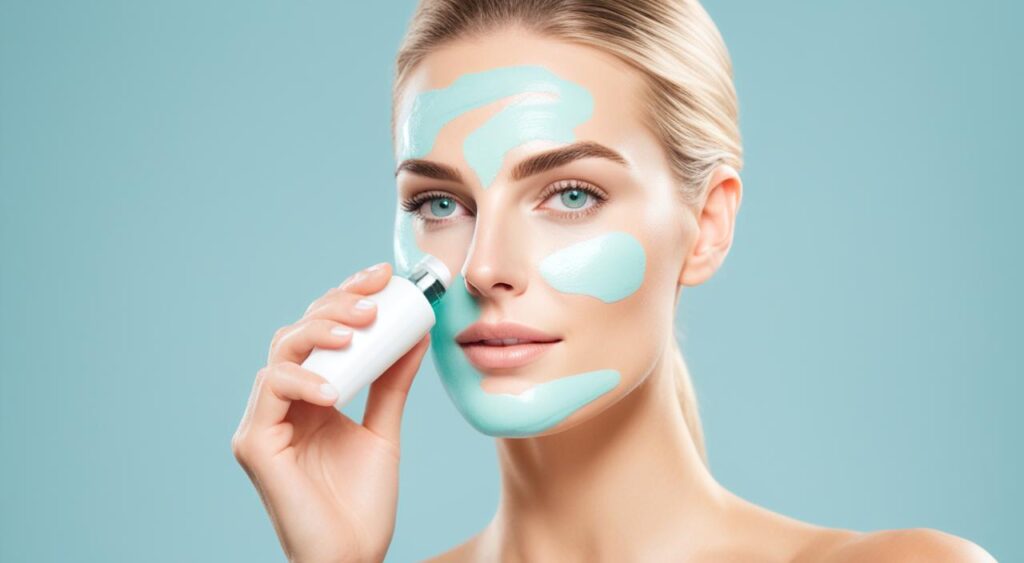
Adding a toner to your oily skin routine brings extra benefits. It helps clean the last impurities. It also evens out your skin’s pH level. This makes it easier for your skin to soak up other skincare products later.
Benefits of Using a Toner
For those with oily skin, toners are a great help. They cut down on oil, shrink your pores, and make your skin feel fresh and not greasy. They also calm down any redness or irritation from washing, giving you a happy, even skin.
Ingredients to Look for in Toners
For oily skin, pick toners with salicylic acid, glycolic acid, or lactic acid. These help to gently clear out your pores. They also help control how much oil your skin makes. In turn, your skin will look and feel smoother.
After you wash your face, toner is your next best friend. It helps your skin stay not-shiny. And it feels cool and relaxed. Adding this to your daily routine can really make a difference for oily skin. It can help keep your skin looking and feeling good.
Exfoliation for oily skin
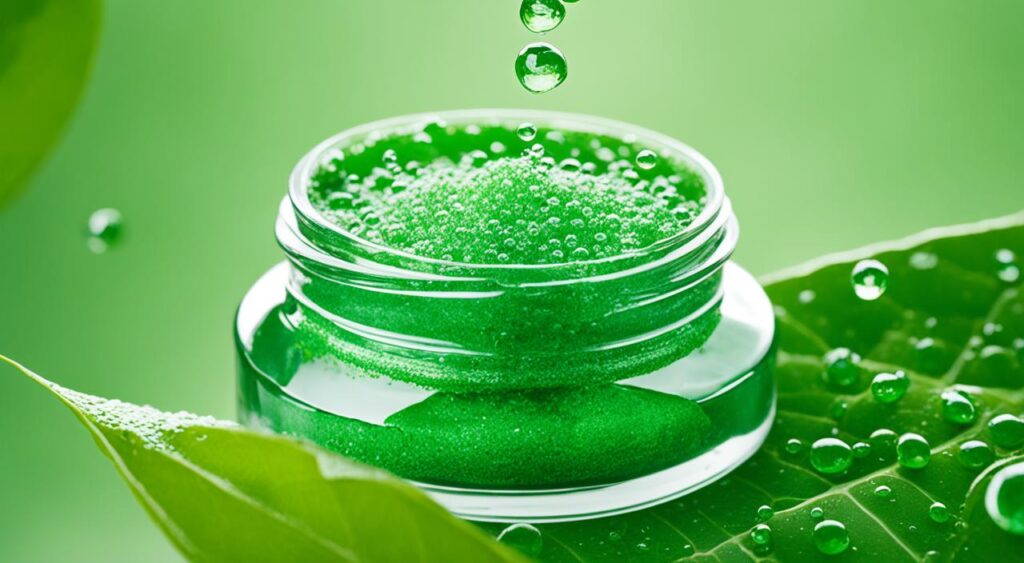
Exfoliation is key for a good skincare routine, especially for oily skin. It gets rid of dead skin cells and clears out pores. This makes your skin feel smoother, shrinks large pores, and stops future breakouts.
Types of Exfoliants
There’s physical and chemical exfoliants. Physical ones are like scrubs that scrub off dead skin. Chemical exfoliants use acids to dissolve dirt and oils, like salicylic acid.
Chemical exfoliants are great for oily skin because they go deep into the pores. They clean out oil and dirt more effectively. It’s best to choose products with salicylic acid, glycolic acid, or lactic acid.
Frequency and Techniques for Exfoliation
Using chemical exfoliants a few times a week is best for oily skin. Mix it gently into your routine. Avoid harsh scrubbing since it can make things worse by causing irritation and more oil.
After exfoliating, always use soothing, hydrating lotions. This keeps your skin healthy and ready to absorb other skin treatments. With the right exfoliating routine, your skin will feel smoother and look better.
Treating Acne and Blemishes
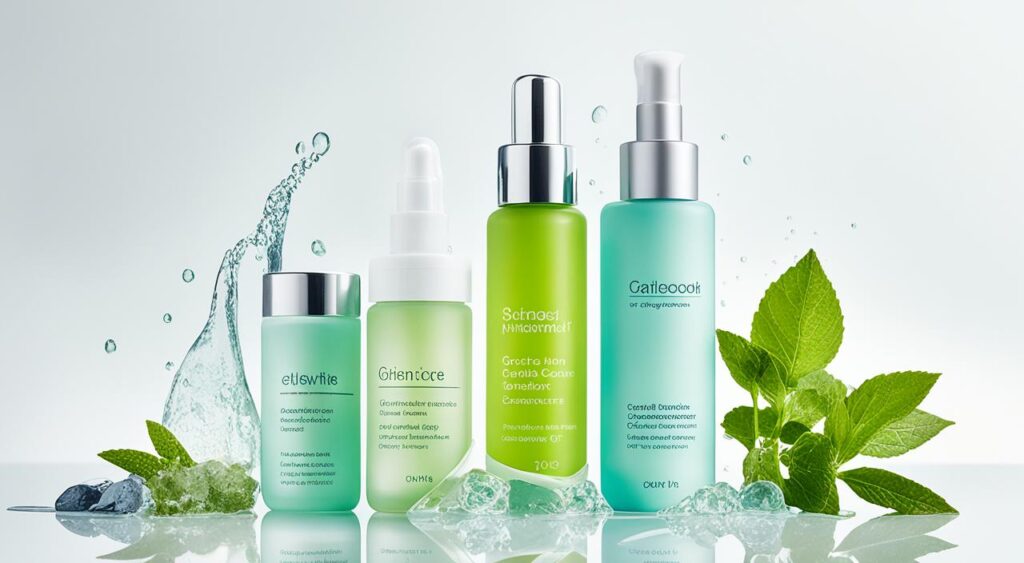
Oily skin often leads to acne and blemishes. Dealing with them can be hard. Luckily, there are many treatments that work well.
Over-the-Counter Acne Treatments
For light cases of acne, try OTC products. These have benzoyl peroxide or salicylic acid. They kill bacteria, clean out pores, and control oil. This reduces current breakouts and stops new ones. Always use OTC treatments with care. Include them in your regular skin care to avoid skin dryness or irritation.
Prescription Acne Medications
Harder to treat or ongoing acne might need prescriptions. Doctors can suggest things like retinoids, antibiotics, or hormone therapy. These stronger options deal with the root of your breakouts. They help clear your skin and keep it from breaking out again. Using these medications correctly is key. Always follow your doctor’s advice for the best results.
Moisturizing Oily Skin
People with oily skin might avoid moisturizer to prevent more shine. But, keeping the skin hydrated is key, even if it’s oily. Skipping moisturizer can make the skin produce more oil. It does this to make up for the lack of moisture.
Importance of Moisturizing
Keeping oily skin well moisturized is very important. Without enough moisture, the skin makes more oil. This can lead to too much shine and blocked pores. Using the right moisturizer can balance oil production. It also stops the skin from getting too dry or irritated. This keeps the skin looking even and healthy.
Choosing the Right Moisturizer
For oily skin, pick a moisturizer that’s light, free from oil, and non-clogging. Look for ingredients like hyaluronic acid, niacinamide, and ceramides. They hydrate without adding grease. Stay away from thick moisturizers. These might make the skin look shinier and cause acne. Use a moisturizer both in the morning and at night. This helps the skin stay properly hydrated without making too much oil.
Sun Protection for Oily Skin

Sun protection is key for oily skin. UV rays can cause aging, dark spots, and cancers. Choosing the right sunscreen helps keep your skin balanced and healthy.
Types of Sunscreens for Oily Skin
For oily skin, pick sunscreens that are light, oil-free, and won’t clog pores. Sunscreens with zinc oxide or titanium dioxide work well. They offer full protection without being heavy or greasy.
Importance of Sun Protection
Use sunscreen every day, even if it’s cloudy. The sun can make your skin produce more oil. This can lead to a shiny face and more blemishes. A good sunscreen keeps your skin looking matte and protects it from UV harm.
Oily Skin Treatments and Masks
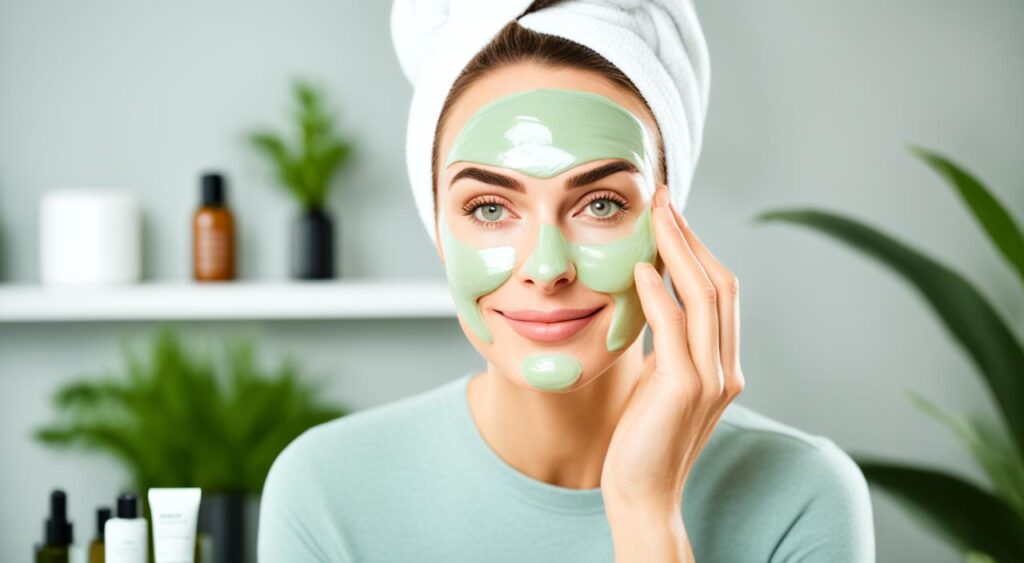
Along with your daily skincare, using treatments and masks can do wonders for oily skin. These products are designed to tackle issues like too much oil, large pores, and pimples. This comprehensive method helps your skin look and feel balanced and healthy.
Clay Masks
Clay masks, with ingredients like bentonite or kaolin clay, are great for oily skin. They soak up extra oil, clean out pores, and make your skin look less shiny. They take out dirt and oil, making your skin less greasy and your pores less noticeable. Using a clay mask once or twice weekly really boosts your skincare routine.
Charcoal Masks
Charcoal masks work just like clay masks by soaking up oil and clearing pores. The charcoal acts like a magnet, pulling out dirt, dead skin, and other stuff that can make your skin oily or cause breakouts. A regular charcoal mask can make your pores look smaller and your skin feel great.
Peel-off Masks
Peel-off masks with AHAs or BHAs offer a gentle way to exfoliate oily skin. These ingredients take away dead skin cells, making your skin look and feel smoother. The peeling also cleans out your pores and can make pimples less apparent. Using a peel-off mask weekly helps keep your skin in good shape.
Makeup and oily skin
To cover oily skin, it’s key to pick items that fight shine and last long. Choose oil-free and non-comedogenic foundations, concealers, and powders. These will make your pores look smaller and stop too much oil during the day.
Also read: Best Skin Care Routine For Healthy And Glowing Skin
Oil-Free and Mattifying Makeup
Search for “oil-free” or “mattifying” makeup labels. They’re great for oily skin, as they use silica or dimethicone to soak up extra oil. For a smoother starting point, use an oil-free primer before your foundation.
Setting Powders and Sprays
End your makeup routine with a setting powder or spray to make it last. Go for powders with rice starch or corn starch for shine control without a heavy feel. Mattifying setting sprays will also help maintain your look and reduce oil.
FAQs
What are the main causes of oily skin?
Genetics play a big role in oily skin. Hormonal changes, weather, and certain drugs also contribute.
What are the signs and symptoms of oily skin?
A constant shine, often having blackheads, and skin feeling thick are common signs. Heavy feeling skin is also seen.
Is it true that people with oily skin don’t need to moisturize?
It’s a myth that they should skip moisturizer. Even oily skin needs moisture to stay balanced and not produce too much oil.
What type of cleanser is best for oily skin?
Choose a foaming cleanser with salicylic acid or benzoyl peroxide. These control oil and prevent breakouts. Stay away from harsh cleansers that dry skin.
Gently exfoliate oily skin 1-2 times a week. Use circular motions to avoid irritating the skin.
What ingredients should people with oily skin look for in a moisturizer?
Oily skin does best with oil-free, lightweight moisturizers. Look for hyaluronic acid, niacinamide, and ceramides in the formula.
What type of sunscreen is best for oily skin?
Choose a light, non-greasy sunscreen. Mineral sunscreens with zinc oxide or titanium dioxide are ideal for oily skin.
How can clay masks and charcoal masks benefit oily skin?
Clay and charcoal masks absorb excess oil and clean deep in pores. They also reduce shine, which is great for oily skin.
What type of makeup is best for oily skin?
Opt for oil-free, non-comedogenic makeup. This helps lessen pore visibility and control oil. It should last all day without making skin too oily.




